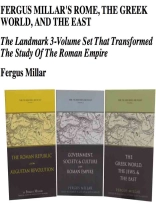Fergus Millar is one of the most influential contemporary historians of the ancient world. His essays and books, including The Emperor in the Roman World and The Roman Near East, have enriched our understanding of the Greco-Roman world in fundamental ways. In his writings Millar has made the inhabitants of the Roman Empire central to our conception of how the empire functioned. He also has shown how and why Rabbinic Judaism, Christianity, and Islam evolved from within the wider cultural context of the Greco-Roman world.
This is a three-volume collection of Fergus Millar’s essays, which transformed the study of the Roman Empire by shifting the focus of inquiry onto the broader Mediterranean world and beyond.
Volume I: Opening this collection of sixteen essays is a new contribution by Millar in which he defends the continuing significance of the study of Classics and argues for expanding the definition of what constitutes that field. In this volume he also questions the dominant scholarly interpretation of politics in the Roman Republic, arguing that the Roman people, not the Senate, were the sovereign power in Republican Rome. In so doing he sheds new light on the establishment of a new regime by the first Roman emperor, Caesar Augustus.
Volume II: This second volume of the three-volume collection of Millar’s published essays draws together twenty of his classic pieces on the government, society, and culture of the Roman Empire (some of them published in inaccessible journals). Every article in Volume 2 addresses the themes of how the Roman Empire worked in practice and what it was like to live under Roman rule. As in the first volume of the collection, English translations of the extended Greek and Latin passages in the original articles make Millar’s essays accessible to readers who do not read these languages.
Volume III: The 18 essays presented here include Millar’s classic contributions to our understanding of the impact of Rome on the peoples, cultures, and religions of the eastern Mediterranean, and the extent to which Graeco-Roman culture acted as a vehicle for the self-expression of the indigenous cultures. The volume also includes an epilogue by Millar written to conclude the collection.
लेखक के बारे में
Guy M. Rogers is professor of classics and history at Wellesley College.












